

Ewelina H. (European Commission, Directorate-General for Energy)
“I joined the Directorate-General for Energy in 2015, after four years in the European Parliament, where I had followed a range of topics related to external relations of the EU, including the external security of energy supply. In ENER, I first worked as a liaison officer for relations with the EP, then as international relations officer in charge of Turkey and Western Balkans, and now I handle external communication of all our policy initiatives. Over these seven years, I have seen a very impressive evolution the EU's energy policy. In 2015, the word on everyone’s lips was ‘Energy Union’. Designed as a political reaction to Russia’s first invasion of Ukrainian territories in 2014, it gave important impetus to the roll-out of renewable energy sources and to greater, targeted focus on energy efficiency. An impressive body of legislation followed, translating policy priorities into concrete targets, tools and measures, and putting people at the heart of the clean energy transition. Energy is also one of key sectoral policies of the European Green Deal – it underpins many proposals that will allow us to deliver on a climate-neutral Europe by 2050. Finally, over the past year I have been able to witness how European policies bring responses to crisis situations, defying the usual perception of slow bureaucratic processes. The actions undertaken by the EU since Russia’s invasion of Ukraine in February 2022, such as REPowerEU phasing out our dependence on Russian fossil fuels way before 2030, are an inspiration, and contribute to a new page in the history of European energy policy.”
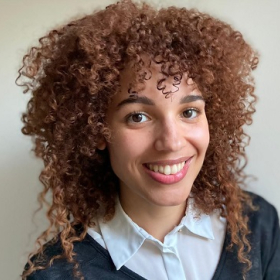
Alice, learning, development, well-being and DEI assistant, Co-President of Diversité Europe
“I’m Alice and I work for the Greens/EFA in the European Parliament as a learning, development, well-being and DEI (Diversity, Equality and Inclusion) assistant.
I am also the co-President of “Diversité Europe”, the Inter-institutional staff association whose one of the main objectives is to raise awareness of ethnic and racial diversity and promote the inclusion of all staff in all categories and at all career levels within EU institutions and bodies.
What makes EU institutions extraordinary is people with ordinary dreams working there. I genuinely only wanted to grow old in a Europe where equity, equality and inclusion are also a reality for people like me, and not anymore a promise only. I would really encourage people from diverse backgrounds to join the EU institutions to ensure that we leave to the next generation a European heritage we can all be proud of.”
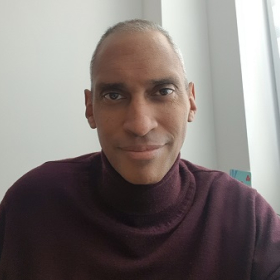
Stephane, responsible for defining and delivering services to researchers
"I am Stéphane, I work at the Directorate-General for Research and Innovation. I am responsible of the unit in charge of defining and delivering services to researchers everywhere in Europe, to help them turn the results of their research work into new products, services, and knowledge useful to our local, regional, or national public authorities.
I was born in Marseilles with French, German and Senegalese origins (at least as far as I know!). I’ve always felt very attracted by the European project, and I’ve always had the chance in my professional career, before joining the Commission, to stay safe from racism and discrimination. So, I did expect neither more nor less than being treated as any other European citizen in this institution, which is the feeling I’ve got throughout this fantastic professional experience”.
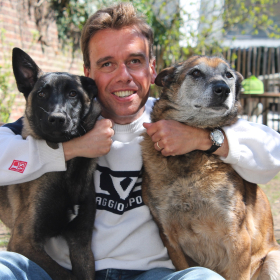
Frédéric, Policy officer
"I am Frédéric and I 've been working for the EU institutions since 1998. I used to be in charge of accessibility for people with reduced mobility at the OIB (the European Commission's office for infrastructure and logistics) for many years.
I am currently working at the Diversity and Inclusion Office at the DG Human Resources and Security (EU Commission) as a policy officer specialising in disability and mainstreaming accessibility initiatives across learning and development, outreach and communication.
The handicap is an advantage here! I present it in a joyful way. I do not give the impression of dragging all the misery of the world behind me. And because I have a dog, it helps, it is the mascot."
Petra H. (European Commission)
“I love hearing my children communicate effortlessly and seamlessly in their three languages (French from a local school, Swedish and Spanish at home) and that they do not even stop and reflect over how wonderful it is that they can do it! We enjoy walking to the market in Place Dumon (Stockel) on a Saturday and buy the best waffles in town. Having take-away frites from the local “friterie” – everyone gets to choose their favourite sauce: mayonnaise, sauce andalouse or just ketchup (not very Belgian). La Promenade verte which stretches 60 km around the city is a wonderful place for cycling and walking. You can stop at Parc Malou and have a beer, coffee or an ice cream in the summer while the children play in the big playground. Spring arrives earlier in Brussels and summer lasts longer… who could not love that?”
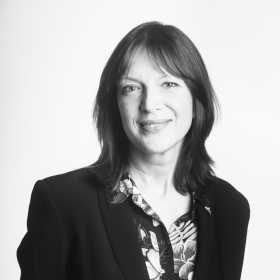
Agnieszka (Council of the EU)
“My name is Agnieszka Ruminska, I am Polish and I have been working for the Council since 2010. I was attracted to join this Institution because of the role it plays at the EU level - the Council is an essential EU decision-maker. Discovering the mechanics of the Member States’ negotiations and working every 6 months with different bosses (rotating Presidencies) has been for me an amazing experience! I started in the unit dealing with the EU General Budget and the Financial Regulation. The EU budget is like a lens where all the EU actions and programs come together - in numbers. And when it comes to the taxpayers’ money – the negotiations can be very tough! Not only among the 27 Member States as the second arm of the Budgetary Authority, the European Parliament, must agree on the numbers too. After a lengthy discussion that can last until late at night – you learn the art of compromising.
After 7 years I moved to completely different field of work: banking and financial services, which opened for me a door to a world of finance. The legislative activity at that time focused mainly on handling the legacy of the financial crisis and making sure our banks remain safe.
Currently I still work in finance – but relatively far from the political activity - I am responsible for the preparation and oversight of the implementation of the Council and the European Council budget. Although political negotiations are not part of my job anymore, I still feel responsible for making sure that the conditions for an agreement are there, and that discussions among Member States are taking place in an optimal and pleasant working environment.”
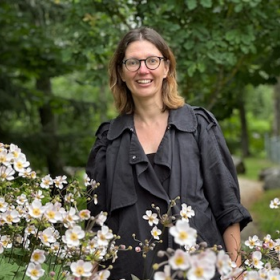
Sigita (Lawyer-linguist - Court of Justice of the EU)
Teisingumo Teisme pradėjau dirbti beveik tuo pat metu, kai Lietuva įstojo į Europos Sąjungą, neseniai baigusi teisės studijas Lietuvoje ir Prancūzijoje. Tuo metu buvo labai mažai lietuvių teisininkų, kurie mokėtų prancūzų kalbą taip gerai, kad sugebėtų išversti teisinį tekstą. Ir ne bet kokį teisinį tekstą, o tokį, kuriame Europos Sąjungos teisė persipynusi su valstybių narių teisės sistemomis ir kyla sudėtingų teisės taikymo problemų labai įvairiose srityse, net tokiose, kurios Lietuvoje tuo metu buvo tik pradedamos plėtoti. Taigi, siekiant kuo tiksliau gimtąja kalba perteikti Teisingumo Teismo teisinę mintį, teko ir tebetenka nemažai paplušėti: pasirausti bylos dokumentuose, pasikonsultuoti su kolegomis, kalbininkais, teisėjų kabinetų nariais ir kitomis tarnybomis ar net apsilankyti didžiausioje Europos Sąjungos teisinių leidinių bibliotekoje.
Dirbdama dvidešimt metų tarptautinėje Liuksemburgo aplinkoje su kompetentingais kolegomis, ES teisės ir lyginamosios teisės specialistais, labai daug išmokau. Šiuo metu teisinius dokumentus verčiu ne tik iš prancūzų, bet ir anglų bei ispanų kalbų, mokausi vokiečių. Man labai patinka, kad mano darbe profesinis mokymasis (įskaitant užsienio kalbas) labai skatinamas ir sudarytos puikios sąlygos kompetenciją tobulinti tiek institucijos viduje, tiek seminaruose ar mokymuose visoje Europoje. Dėl technologijų raidos teisininko lingvisto profesija per šį laikotarpį labai pakito, ir man kartu su kolegomis teko įgyti daug visiškai naujų įgūdžių. Šaunu, kad mūsų institucijoje tam sudarytos puikios sąlygos, taip pat užtikrinamos geros socialinės garantijos, puikiai įrengtos darbo vietos, o lankstaus darbo grafiko galimybė labai padeda suderinti šeimos ir profesinį gyvenimą. Institucijoje rūpinamasi ir malonia darbo aplinka: organizuojami kultūriniai, sportiniai, socialiniai renginiai, asmeninio tobulėjimo mokymai, darbo dieną smagu aktyviai pradėti ar užbaigti dideliame sporto centre.
Nekantrauju Jus, savo naują kolegą, pasveikinti Europos Sąjungos Teisingumo Teisme!
Nuoširdūs linkėjimai iš gražiojo Liuksemburgo,
***
I joined the Court of Justice almost at the same time as Lithuania joined the European Union, having recently graduated in law in Lithuania and France. At that time, there were very few Lithuanian lawyers who knew French well enough to translate a legal text. And not just any legal text, but one in which European Union law is intertwined with the legal systems of the Member States, and which raises complex problems of legal application in a wide variety of areas, even in areas that were just beginning to be developed in Lithuania at the time. Thus, in order to convey the Court of Justice's legal reasoning as accurately as possible in my native language, it has been, and continues to be, necessary to do a great deal of work: to review case documents, to consult colleagues, linguists, members of the judges' chambers and other services, and even to visit the largest library of European Union law publications.
Working for twenty years in the international environment of Luxembourg with professional colleagues, specialists in EU law and comparative law, I have learnt a lot. I am currently translating legal documents not only from French, but also from English and Spanish, and I am studying German. I like the fact that professional learning (including foreign languages) is very much encouraged in my job and that there are excellent opportunities to develop my competences, both within the institution and in seminars or training courses throughout Europe. Technological developments have changed the legal linguistics profession considerably during this period, and I have had to acquire many completely new skills, as have my colleagues. It is great that our institution offers excellent conditions for this professional development, as well as good social security, well-equipped workplaces and the possibility of a flexible work schedule, which is a great help in reconciling family and professional life. The institution also provides a pleasant working environment, with cultural, sporting and social events, personal development training, and a great place to start or end the working day with a session in the large sports centre.
I look forward to welcoming you, my new colleague, to the Court of Justice of the European Union!
Sincere greetings from the beautiful city of Luxembourg,
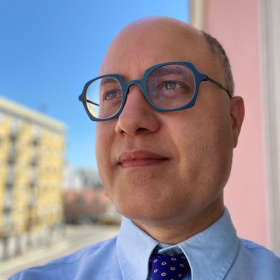
Luís A. (EPSO)
“I never cease to be amazed by the many green spaces available to us in Brussels. My family always enjoys spending time at the Rouge Cloître, a park that brings together young and old, and where you can go for a walk in the forest, stroll along the lakes, or sip a fragrant cup of hot chocolate in wintertime. Another of my family’s favourite spots is the Châtelain Market, where you find all kinds of fresh produce and get the feeling of being in a small village market.”
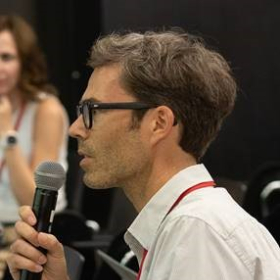
Robert (Joint Research Centre)
“My name is Robert and I am working in the Joint Research Centre (known internally as ‘JRC’), where I lead a small team working on Applied Environmental Economics. With a view on the EU Green Deal, we support the development of Circular Economy policies, comparing different options and providing ex-ante assessments on their market and non-market impacts. I love what I am doing because the topics keep changing and always offer new learning opportunities, and the exact same can be said about my colleagues and the working environment! If you – like me – want a job ‘with a purpose’ and one that is intellectually and personally stimulating, then you should apply!”
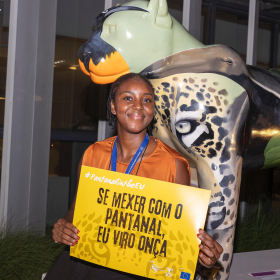
Mariama, policy officer – EU Delegation to Brazil
"My name is Mariama, and I am currently working at the EU Delegation to Brazil as a policy officer. Delegations and Headquarters both offer a stimulating and cosmopolitan workplace. I have always been fascinated by the diverse profiles of my colleagues - being their professional, educational, linguistic or personal background. This diversity proves that one can pursue different career paths within the EU institutions according to one’s interests and a plethora of issues.
With a minority and/or an intersectional background, we can easily struggle with the imposter syndrome and question whether we belong to a certain place. Because you cannot be what you do not see, I truly believe in the power of representation and role models at all levels. As Claire Marin puts it : « Plus une place est désincarnée, imaginaire, moins je peux espérer l’occuper, l’habiter ». Thus, if people can witness that there are actually EU staff « like them », EU careers could have a stronger appealing effect.
No matter our background(s), we are daughters and sons of Europe, one should never hesitate to take opportunities to contribute to the European project!"

